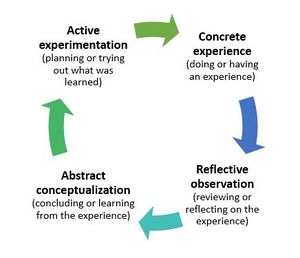Experiential Learning: Difference between revisions
Tanvivartak (talk | contribs) (Created page with "= Overview = Experiential learning builds on the work of Piaget, Lewin and Dewey <ref> Nielsen-Englyst, L. (2003). Game design for imaginative conceptualisation. Proceedings of the international workshop on experimantal interactive learning in industrial management, Allborg (pp. 149 – 164) </ref>. It consists of several models that stress the importance of direct experience and reflective observation == Kolb's Experiential Learning Model == File:Kolbs Learning Sta...") |
Tanvivartak (talk | contribs) |
||
| Line 7: | Line 7: | ||
[[File:Kolbs Learning Stages.jpg|thumb|300x300px|'''Kolb's Learning Stages''']] | [[File:Kolbs Learning Stages.jpg|thumb|300x300px|'''Kolb's Learning Stages''']] | ||
According to Kolb's experiential learning model, there are four stages central to experiential learning. | |||
= Example = | = Example = | ||
Revision as of 21:09, 23 February 2023
Overview
Experiential learning builds on the work of Piaget, Lewin and Dewey [1]. It consists of several models that stress the importance of direct experience and reflective observation
Kolb's Experiential Learning Model
According to Kolb's experiential learning model, there are four stages central to experiential learning.
Example
Evidence
Implications and Design Critique
Conclusion
References
- ↑ Nielsen-Englyst, L. (2003). Game design for imaginative conceptualisation. Proceedings of the international workshop on experimantal interactive learning in industrial management, Allborg (pp. 149 – 164)

